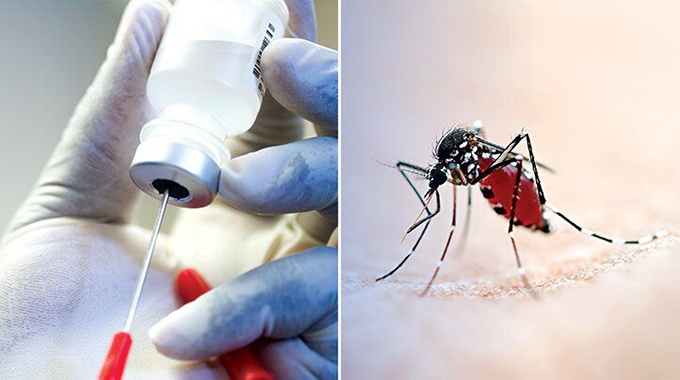More support needed towards elimination of malaria

Hazel Marimbiza
Malaria deaths have sharply declined in Zimbabwe with the country achieving a 79 percent reduction in cases between 2004 and 2020.
The official information was released as the country joined the rest of the world in celebrating World Malaria Day on April 25.
In 16 years, the coordinated efforts of the Government and international organisations have contributed to the substantial drop in malaria cases in Zimbabwe.
According to the World Health Organisation’s World Malaria Report 2020, 7,6 million malaria-related deaths have been averted since 2000. This is a huge success resulting from concerted efforts by governments, partners and multilateral institutions such as the Global Fund partnership, which provides 56 percent of all international financing for malaria, and has invested more than US$13,5 billion in malaria control programs since 2002.
Although the world has a significant decline in both incidence and deaths due to the availability of some of the best interventions, malaria is still an ubiquitous killer especially among children and pregnant women who account for more than 80 percent in the number of deaths.
Half of the world still lives at risk of malaria; 409 000 people died from the disease in 2019. An estimated two thirds of these deaths are among children under the age of five.
In Zimbabwe, statistics continuously show that the disease remains a major challenge in certain districts particularly in seven of the country’s 10 provinces.
The primary malaria endemic zones are in the northern and eastern regions bordering Mozambique and Zambia. There are several districts that are malarial with some of them categorised as high-burden malaria areas. The worst affected districts are in the provinces of Manicaland, Mashonaland East and Mashonaland Central. For instance, approximately 83 percent of all malaria cases and 50 percent of all malaria-related deaths in 2014 originated from these three provinces, while 42 percent of all cases and 26 percent of all deaths were recorded in Manicaland province.
One of the reasons why transmission is more intense in these places is because of climatic conditions which affect the number and survival of mosquitoes, such as rainfall patterns, temperature and humidity. In many of these places, transmission is seasonal, with the peak during and just after the rainy season. Malaria epidemics can occur when climate and other conditions suddenly favour transmission in areas where people have little or no immunity to malaria.
Due to the challenges still faced by the country in eliminating malaria in these districts, the World Health Organisation (WHO) has warned Zimbabwe to not be complacent in dealing with the disease especially during this time when more focus seems to be directed to fighting Covid-19.
“There is a risk of paying less attention to diseases such as malaria while fighting Covid-19. During the Covid-19 pandemic, the malaria community must remain committed to supporting the prevention of malaria infection, illness and death through preventive and case management services, while maintaining a safe environment for patients, clients and staff. Deaths due to malaria and its comorbidities (anaemia, undernutrition, etc) must continue to be prevented,” said a recent WHO report.
Malaria, along with Aids and TB, is one of the biggest killers in Zimbabwe though the evidence of the past 16 years shows a declining challenge. However, unlike Covid-19, the disease is treatable at local level using rapid diagnostic tests.
To prevent and control malaria in Zimbabwe, vector control and case management strategies complemented by social behaviour change communication remain the pillars in all regions with moderate to high transmission.
WHO recommends protection for all people at risk of malaria with effective malaria vector control. Two forms of vector control – insecticide-treated mosquito nets and indoor residual spraying — are effective in a wide range of circumstances.
In a statement, Manicaland Provincial Medical Director, Dr Patron Mafaune said providing mosquito nets helps to cope with the disease.
“Residents should be educated on the importance of consistent use of long-lasting insecticide-treated nets. The district has to improve on preventive measures like distribution of long-lasting insecticide-treated nets and lobby for more human resources to assist with malaria surveillance thus, curbing the recurrence of malaria outbreaks in the future. To counter the possibility of another malaria outbreak, these measures have to be instituted promptly,” said Dr Mafaune.
She further highlighted that there was also need for mosquito larvicides to eliminate immature mosquitoes.
A larvicide is a type of insecticide used to control mosquitoes indoors and outdoors around homes. They work by killing mosquito larvae before they can grow into adults. Some formulations are activated when ingested by the mosquitoes, and some formulations work when they come into contact with the larvae.
“What we require are larvicides so that we can treat the mosquito breeding sites as well as mosquito repellents so that our community can even become better protected,” she said.
She also said health promotion messages should emphasise the importance of closing eaves and other entry points of the malaria vector, and constructing better houses in the future.
Mutoko District acting medical officer Dr Prince Mangwiro, said more needs to be done to educate people on the importance of health as the worst affected were religious organisations whose doctrine do not allow them to seek medical health services.
“If villagers are educated, they will quickly seek medical attention if they suspect to have contracted the disease because some present themselves late to health facilities and this contributes to high deaths,” said Dr Mangwiro.
The Vice President and Minister of Health and Child Care, Dr Constantino Chiwenga via twitter concurred with Dr Mangwiro and Dr Mafaune. He recommended the use of appropriate malaria prevention interventions- sleeping under a net, allowing houses to be sprayed and going for testing and treatment of malaria within 24 hours of symptoms.
Despite major progress in malaria control, prospects and challenges for malaria elimination, there is also a need to contribute to a better understanding of how Zimbabwe and its partners can ride on the current decline in malaria burden, and see feasibilities beyond the present challenges to accomplish malaria control interventions agenda and prepare towards nationwide malaria elimination goals in the near future.
Mr Abel Mutizwa, a researcher said it’s crucial not only to sustain the current milestones in malaria control interventions, but rather to improve the control strategies for eliminating local malaria transmission in Zimbabwe.
“While it appears certain that opportunities exist in Zimbabwe to accomplish the global goal for malaria elimination, it would be feasible if the new technical and operational challenges to the permanent interruption of local transmission could be overcome,” said Mr Mutizwa.
“The occurrence of resistance to malaria medicines and insecticides, a genuine possibility of reduced funding by Government and partners due to exceptionally low incidence rates, improper guidance to the circumstances under which it may be appropriate to scale-back vector control interventions, and failure to strengthen surveillance systems, as well as lack of data for evidence-based decision-making are the new challenges threatening to reverse the gains made towards malaria control and elimination in Zimbabwe.”
Mr Mutizwa said great potential and opportunities to eliminate malaria in the country exist.
“If malaria was eliminated in temperate regions of Europe and Americas, and other few African countries, applying consistently the same strategies with evidence-based modifications, the disease could be eliminated also in Zimbabwe.
“Even if evidence suggests that current control interventions have played a greater part to substantially reduced malaria burden, elimination is not a business as usual approach. Instead, it needs an improved, systematic and new programmatic strategy supported strongly by sustained funding.
“More so, to achieve malaria elimination goal, there is need for operational research, and strong monitoring and evaluation system all year round until the cessation of local transmission in the country,” he said.









Comments